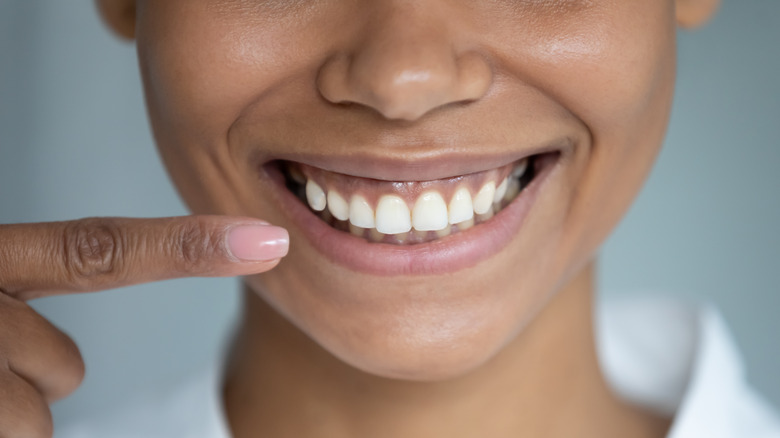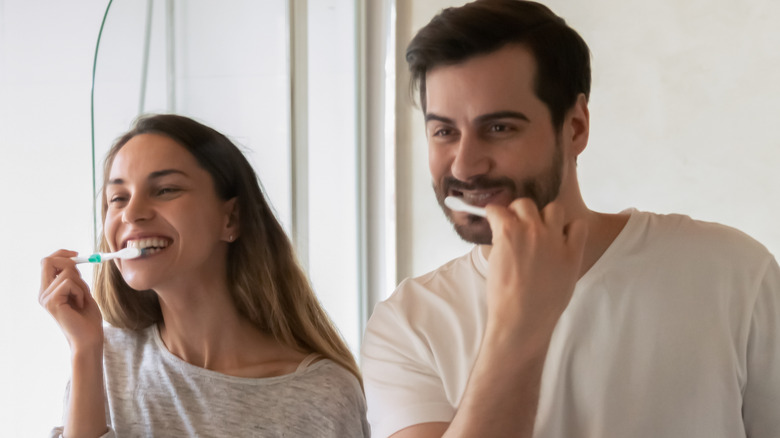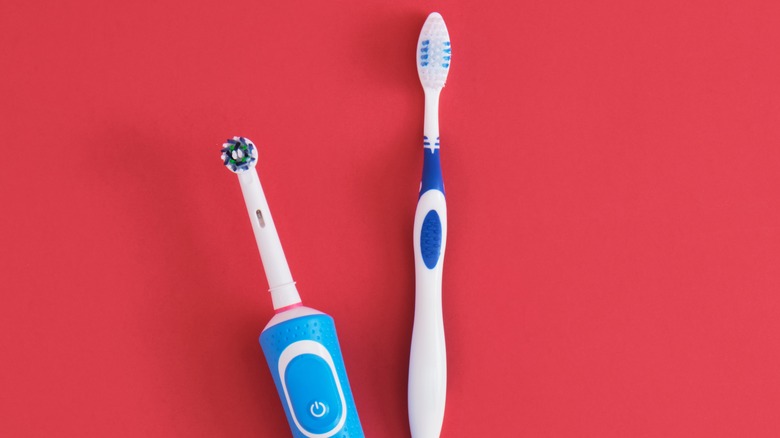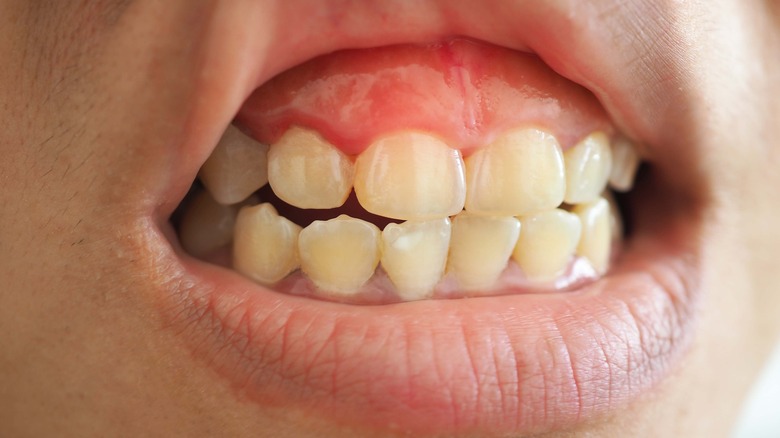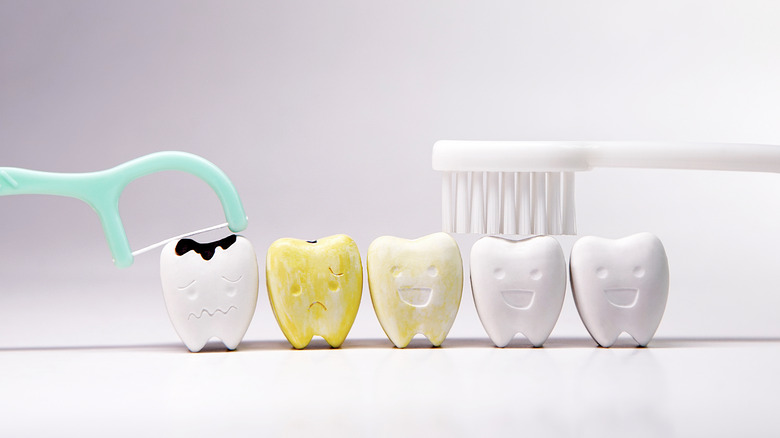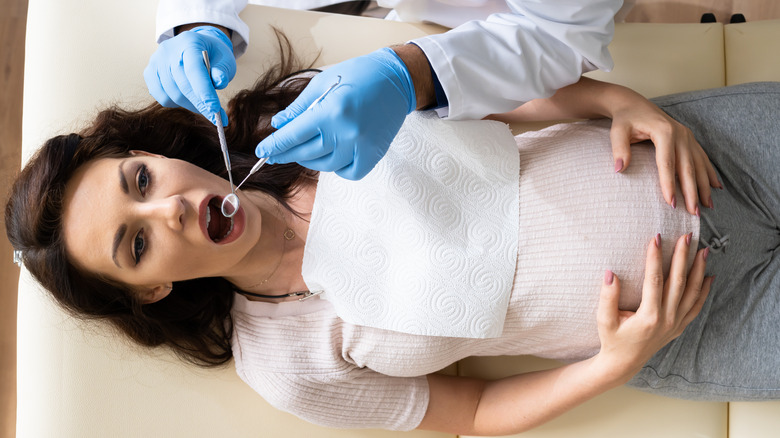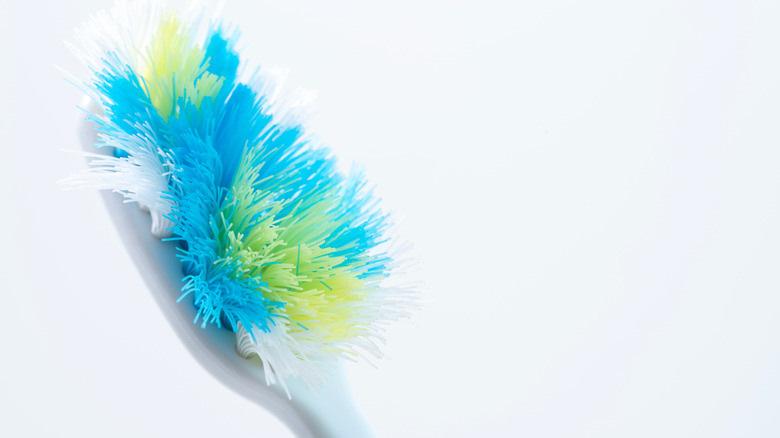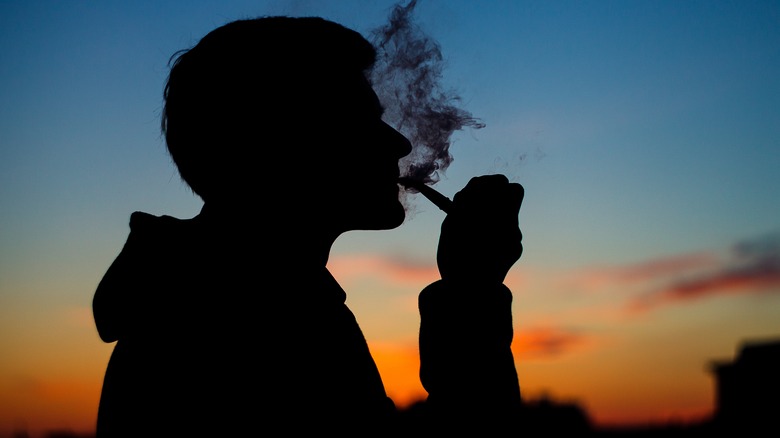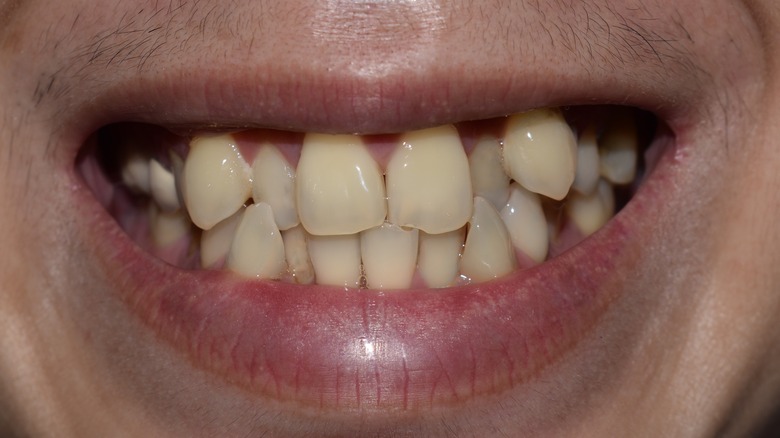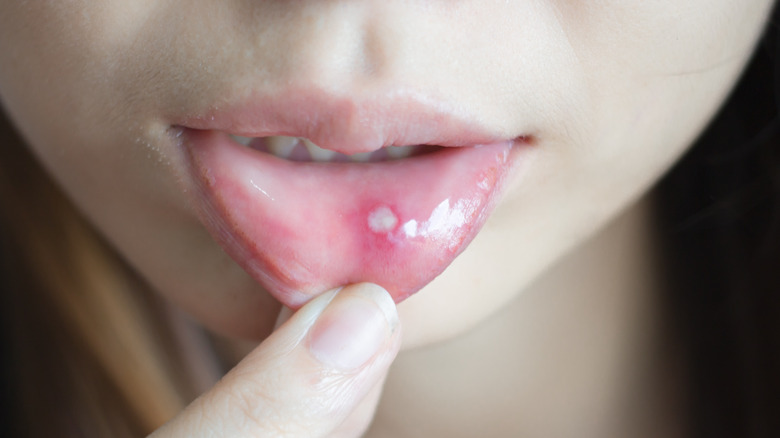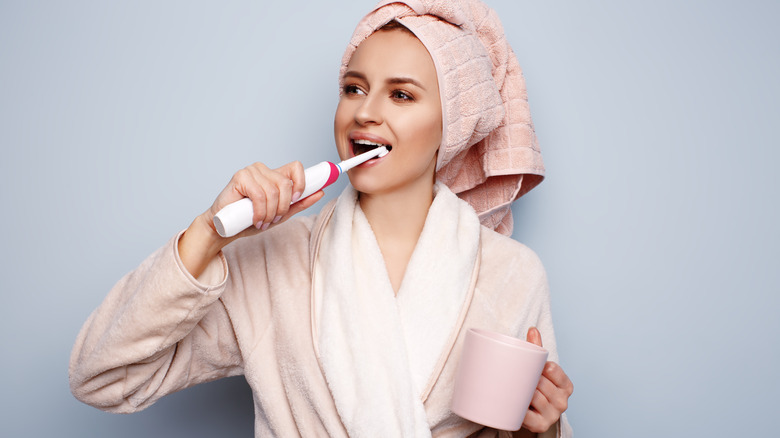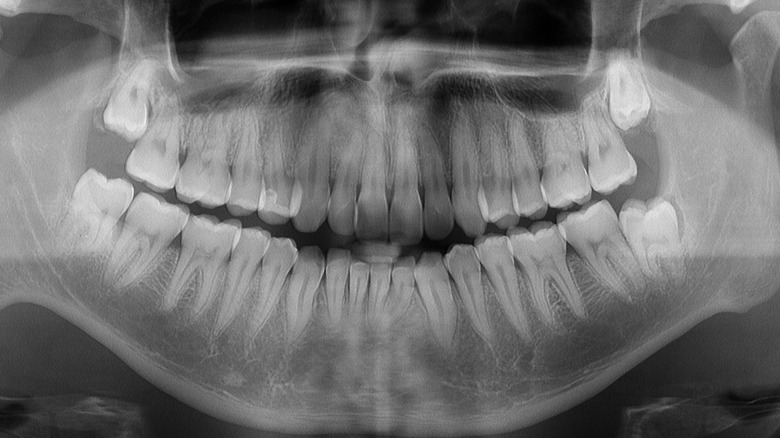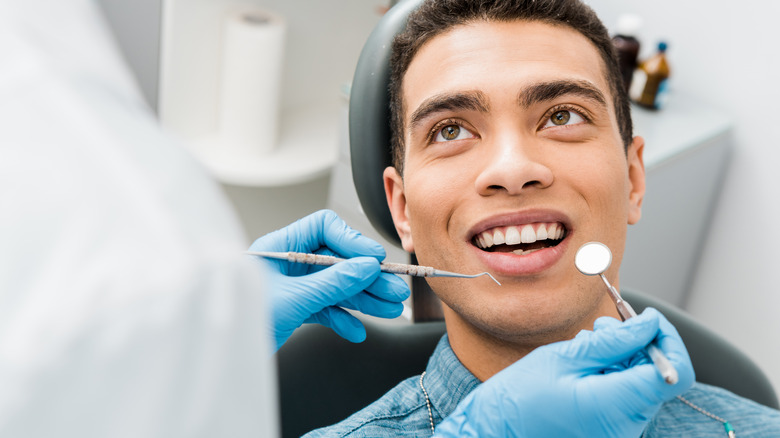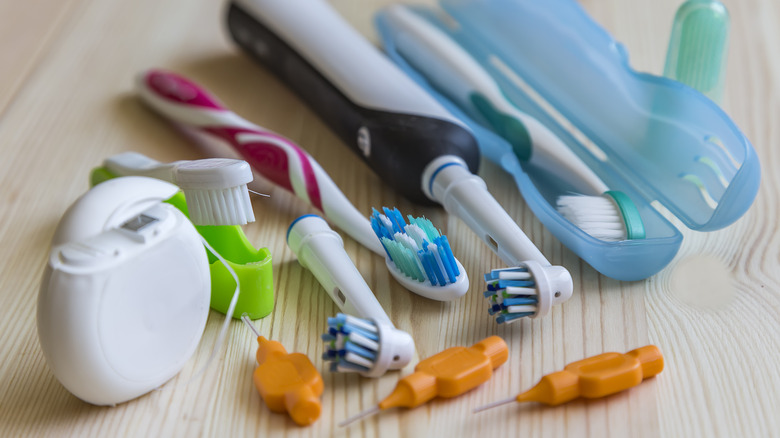Mistakes You Didn't Realize You Were Making With Your Oral Health
Oral health is so much more than keeping your teeth clean (although that's a major part of it). Your oral hygiene also influences your overall health. Bleeding gums and multiple cavities could give your medical team a glimpse into your potential risk for health problems like diabetes and cardiovascular disease (via Colgate).
That's why it's important not just to brush your teeth properly every day but to also make regular trips to the dentist for cleanings, exams, and fixes. According to the CDC, more than one-quarter of U.S. adults have untreated tooth decay, and about 46% of adults 30 and older have signs of gum disease. Leaving these problems without treatment could result in tooth loss.
However, it's possible that how you've been caring for your teeth throughout your life could be incorrect. Here's what you need to know to keep those pearly whites — and your health — in tip-top shape.
Brushing your teeth too much
Many dentists will tell you to brush your teeth twice a day, preferably in the morning and again at night, for two minutes each time (per Jenson Dental). You might feel inclined to brush more often, just to keep those teeth sparkly clean and smooth. However, you could be doing a disservice to your mouth by doing so.
According to Colgate, it's possible to brush your teeth too much. By "too much," we mean too frequently or too vigorously. If you get into the habit of brushing several times a day or scrubbing your teeth because you think it'll improve their cleanliness, you may actually put your teeth at risk of worn-down enamel, which can lead to tooth sensitivity. Additionally, too much brushing can cause tooth abrasion, which interferes with the structure of your teeth, or gum recession, which may cause an increased risk of tooth decay and sensitivity.
Stick to your dentist's recommendations for brushing for the healthiest smile.
Choosing the wrong toothbrush
When you browse a store's aisle for a new toothbrush, you'll find an overwhelming range of them to choose from. Which one is best for your teeth?
That mostly depends on your current teeth and gum situation. One feature to consider is bristle firmness, which usually ranges from soft to firm. Penn Dental Family Practice states that although you might think a firm bristle could clean teeth better, it can actually wear down your enamel instead. Soft bristles are usually the best option for most people — your dentist can let you know if you should choose something different — so long as you use the right brushing technique for maximum cleanliness.
You might also wonder whether a manual or electric toothbrush is best. A study published in the Journal of Clinical Periodontology found that electric toothbrushes tend to clean teeth and gums better than manual ones, especially electric toothbrushes with oscillating heads. The Oral Health Foundation's chief executive Dr. Nigel Carter adds that while electric toothbrushes were once quite expensive, they've become much more affordable and could be considered an excellent investment for your oral health.
Thinking bleeding gums are no big deal
Many of us have probably seen some blood in the sink here and there after brushing. Sometimes, this happens when we brush too hard or have taken medication (like blood thinners) that can make bleeding happen more easily. However, bleeding gums can also happen when certain health problems are present, such as anemia or liver disease (per Golden State Dentistry).
More often than not, the occurrence of bleeding gums signals gingivitis, a form of gum disease. If you have gingivitis, you might notice swollen, red gums in addition to bleeding. While many forms of gingivitis are mild, gum disease can get out of hand if left untreated for too long. A common complication of gingivitis is periodontitis, which can cause you to lose your teeth. Some people with gingivitis also develop a rarer condition called necrotizing ulcerative gingivitis (NUG) that causes very painful gums with ulcerations (via Mayo Clinic).
The best way to catch gingivitis in its earliest stages is by visiting the dentist regularly. At your appointment, a dental hygienist will examine your gums and take x-rays to check for signs of the disease (per the National Institute of Dental and Craniofacial Research).
Not brushing and flossing the way your dentist recommends
Brushing and flossing your teeth correctly probably seems self-explanatory at this point. However, your dentist points out proper brushing and flossing techniques for a reason. That's because lots of people make mistakes when brushing their teeth or flossing that they don't realize are incorrect.
According to the American Dental Association, here's how to brush your teeth the right way. First, make sure your toothbrush bristles are at a 45-degree angle relative to your gums. Then, move your brush back and forth in little strokes to help clean the surface of each tooth. Be sure to get the inside, outside, and chewing surfaces of every tooth.
Next is flossing — or does that come first? While you may currently be flossing after you brush, it might actually be best to floss first. According to Healthline, flossing first gets food particles and bacteria from between your teeth that brushing then removes from the mouth. When you reverse these tasks, you could end up leaving those flossed particles in your mouth (yuck!). A 2018 study backs this up, with a flossing-then-brushing group of participants seeing a significant reduction in interdental and whole plaque compared to a group that flossed after brushing.
Skipping the dentist during pregnancy
Pregnant women may have several doctor's appointments to attend throughout their pregnancy. Is it necessary to add dental visits to the list?
According to the American College of Nurse-Midwives, yes. Pregnant women have a higher risk of developing problems with their teeth and gums because of hormonal changes and the nausea and vomiting that occur with some pregnancies. Hormones can increase bacteria that sits in the mouth and invades gums and teeth, while stomach acid can erode teeth enamel. When oral issues are left untreated during pregnancy, there is a potential of infection that can affect an unborn baby.
The American Dental Association says that dental visits during pregnancy are usually very safe and highly recommended. Pregnant women may also be able to have dental x-rays and anesthesia to take care of problems like fillings, root canals, or gum treatments. Still, you should always let your dentist know if you're pregnant so that they can take the proper steps to ensure the safety of you and your baby.
Not drinking enough water throughout the day
While most people don't need to drink a gallon of water each day, everyone needs to stay properly hydrated. Water is just as important for your teeth as it is for your overall health.
The American Dental Association states that water cleans your mouth naturally every time you drink it, unlike other beverages like fruit juice and soda with acidic properties that harm your teeth enamel. It can even flush away food particles that get stuck in between your teeth or on their surfaces. Water can also strengthen your teeth if it contains fluoride, a mineral that is known to prevent cavities.
Interestingly, not drinking enough water to the point of becoming dehydrated can also harm your teeth. Dehydration causes dry mouth, which can leave your mouth feeling sticky, hot, and uncomfortable. The National Institute of Dental and Craniofacial Research also lists mouth sores and mouth infections as potential side effects. Additionally, when you're not producing enough saliva due to dehydration, your mouth can't naturally rid itself of bacteria as effectively, which could lead to tooth decay (per the American Dental Association).
Forgetting to replace your toothbrush
By the time your toothbrush looks worn down, it might be past the time you should have replaced it.
According to dentist Amanda Lewis (via Bustle), toothbrushes become less effective at keeping your teeth clean when they start wearing down. "Tooth enamel is the hardest substance in the human body, so when you're using your toothbrush every day, it does wear out the fibers that they're made of. Once the bristles become splayed and frayed their effectiveness decreases, which could up your risk of cavities, bad breath, and other oral health issues."
Dentist Sienna Palmer tells Aquafresh that the ideal length of time to keep a toothbrush is three to four months. After that, it's time for a new one. But replacing it every few months isn't just to make it look or work better. Dentist Nehi Ogbevoen adds that when bristles fray after becoming worn, they have a much higher chance of harboring harmful bacteria that go straight into your mouth when brushing (via Aquafresh).
You continue bad habits
As much as you enjoy doing them, some habits can ruin your teeth. Smoking is possibly one of the worst habits you can have for your oral health in general. According to the CDC, smoking weakens the immune system, which can put you at a higher risk for infections from gum disease as your body becomes less effective at fighting them off. The more you smoke, the greater your risk for developing gum disease and getting infections.
Colgate also warns that alcohol can damage teeth. Not only can some alcoholic drinks — especially colored wines — stain your teeth, but many of them also contain a lot of sugar, which contributes to tooth decay. And if you're an alcohol drinker who also chews on the ice in their drinks, you could risk breaking or chipping a tooth (via Healthline).
Another bad habit you might want to consider breaking if you're concerned about your oral health is eating an unhealthy diet. According to the Oral Health Foundation, sugary and processed foods both boost the likelihood of tooth decay, and acidic foods and drinks could be just as bad. Soda, vinegar, and pickles are among the biggest acidic contributors to tooth enamel erosion.
Not fixing crooked teeth
There's generally no harm in having an imperfect smile. In fact, it's just one of the many things that make you unique! However, fixing crooked teeth goes beyond superficiality. Your smile may look better when it's done, but the fix could also improve your oral health.
Crooked teeth can happen for numerous reasons, including thumb sucking as a toddler or child, early baby tooth loss, and mouth breathing. Some people also have some teeth out of place from mouth trauma or simple genetics (via Colgate). It's common, but even a few teeth out of place could result in big problems for your mouth. Dr. Jackie Korol explains that crooked teeth can make it challenging for you to brush your teeth properly, as toothbrushes can't conveniently fit where they need to with misaligned teeth. It can also lead to gum decay and excessive tooth wear. Some people experience chewing difficulty and jaw pain because their crooked teeth cause a misaligned bite.
There are several options dentists and orthodontists can use to fix your teeth, such as retainers, clear aligners, and braces (per Colgate).
You ignore a canker sore
If you've ever had a canker sore in your mouth, you know what a (painful!) nuisance they can be. According to the Cleveland Clinic, signs of canker sores include a red, white, or gray round sore in your mouth, a tingling or burning sensation in a specific area of your mouth, and in severe cases, a fever or swollen lymph nodes. Because they can be so painful, they may cause you to skip eating and drinking as much as you should to avoid making the pain worse, Dr. Omid Mehdizadeh tells Reader's Digest.
Even more concerning is that what you think is a canker sore could actually be a sign of oral cancer. Dr. Mehdizadeh warns that sores that don't get better or go away completely within a few weeks, bleed, or become firmer could be a sign of mouth ulcers or oral cancer. Island Daily Dental Care adds that sores related to oral cancer may not always be painful and may be flat or raised unlike canker sores, which are usually painful and always flat. When in doubt, make a trip to your dentist.
Brushing your teeth after your morning coffee
You probably know that coffee can stain your teeth. It happens because of the plant tannins in coffee — tea and wine have them too — that build up on enamel. And although you may brush your teeth regularly and have otherwise good oral hygiene, those pesky stains can be very difficult to remove without the help of whitening procedures (per Crest).
Many coffee drinkers are inclined to brush their teeth immediately following their morning cup of joe to avoid stains from yellowing their teeth. However, that might actually be the wrong move. Dentist Christina Meiners tells HuffPost that brushing your teeth before you drink a cup of coffee is the better option. Doing so rids your teeth of plaque so that coffee doesn't have as much to cling to. Additionally, coffee is acidic and therefore chemically abrasive, so you could damage your protective teeth enamel by brushing immediately after you drink it, explains dentist Sonya Krasilnikov (via HuffPost).
Waiting too long to get your wisdom teeth pulled
Wisdom teeth are a third set of molars in the far back of your mouth. Although some people do just fine with their wisdom teeth once they come in, many people need their wisdom teeth removed due to being unable to erupt or causing spacing issues in the mouth. When these teeth don't come in all the way, you're more prone to infections because bacteria gets trapped inside (per Mayo Clinic).
Your dentist may recommend getting your wisdom teeth out when they first begin coming in if they see potential problems with overcrowding or eruption. It's usually not an emergency situation, but waiting too long to get them out could cause more problems down the road. According to St. Luke's OMS, some people experience severe overcrowding issues with their wisdom teeth, leading to expensive fixes. They might also experience sinus problems, jaw pain, and gum inflammation. Dentist Nathan Janowicz stresses the importance of seeing your dentist regularly so they can address any possible issues with your wisdom teeth quickly (via Cleveland Clinic).
Skipping regular cleanings and exams
A fear of dentists — also known as dentophobia — is a real fear that ranges from mild to severe, sometimes causing people such crippling anxiety that they can't sit through an appointment. But even mild nervousness relating to a dentist appointment is enough to keep some people from attending regularly for cleanings and exams (per Verywell Mind).
Whether you fear going to the dentist, you don't make time for appointments in your busy schedule, or you don't think skipping them once in a while will harm anything, it's time to change your way of thinking. The Cleveland Clinic states that professional cleanings are necessary to remove tough plaque that you can't usually get with your toothbrush and cleaning routine. Even people with ideal oral hygiene can benefit from regular cleanings and exams, just to keep everything in the mouth as healthy as possible. Plus, your dental hygienist and dentist can sometimes find potential problems, like signs of gum disease, that you likely wouldn't catch on your own.
The American Dental Association says there's no specific rule to follow, as some people need to visit more frequently than others. However, once or twice a year is a good rule of thumb for most people.
Tossing your toothbrush in a drawer
Do you store your family's toothbrushes together in a drawer or in the medicine cabinet when you're done using them? It might seem innocent enough, but this storage method could actually let a lot of bacteria harbor on the bristles.
Colgate suggests placing toothbrushes in a holder that's made for toothbrush storage, and keeping each toothbrush separate enough so that they don't touch. Be sure to clean the holder regularly, as they also can transfer germs over to your toothbrushes. If you do need to travel with your toothbrush, let it dry completely before putting it in a clean case.
It's also necessary to keep toothbrushes away from the toilet, if possible, UCLA Department of Pathology and Laboratory Medicine's Omai Garner tells Self. When your toilet flushes, it releases what's known as toilet plume, in which microscopic particles from the toilet move through the bathroom — and they could end up on your toothbrush. But don't panic. Board-certified infectious disease and senior scholar Amesh A. Adalja says (via Self), "It is important to remember that [your] toothbrush will never be sterile, [because] whatever environment it is placed in will have microorganisms that will settle upon it." So do what you can to protect it, but don't stress. Even the American Dental Association says that no evidence has proven that the bacteria that lives on your toothbrush can harm you.

